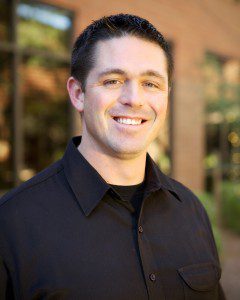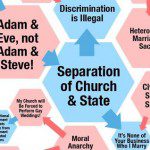Recently I asked whether evangelicals should consider, while holding fast to their views on God’s design for human sexuality and marriage, dropping their insistence that the American legal system should reflect our Judeo-Christian convictions and exclude same-sex marriages. I followed with Ten Things I Believe About Evangelicals and Gay Marriage — and a fantastic conversation ensued in the comments boxes as well as other blogs. I invited friends of various persuasions to engage the issue, including Greg Scott of the Alliance Defending Freedom.
I’m often asked whether the legal establishment of same-sex marriage really presents a threat to religious freedoms. Greg works for a top notch legal organization that labors in the trenches of the religious freedom battle, so he knows the field well. He sent the following piece and I’m proud to publish it as a guest post:
*
 Religious Freedom Isn’t Just for Clergy
Religious Freedom Isn’t Just for Clergy
By Greg Scott
“Religious Freedom and Civil Marriage Protection Act” — “Religious Freedom and Marriage Fairness Act” — “Civil Marriage Religious Freedom Act.”
Sound like perfect laws, right? Who could be against “religious freedom” and “civil marriage” and “marriage fairness?” No decent person, to be sure.
California activist Geoff Kors offers a typical statement in support of this kind of bill:
Opponents of marriage equality have falsely claimed that allowing same-sex couples to marry will force clergy to violate the tenets of their faiths. This bill should alleviate any concerns that restoring marriage equality will require clergy to perform weddings inconsistent with their faith.
So what complaints remain? Aren’t these bills a signal from marriage redefinition advocates that they understand the impact of redefining marriage has on religious freedom and have provided a freedom-friendly middle ground? The short answer is: No. These bills—out of Maryland, Illinois, and California, respectively—and their titles are political war room products that are meant only to cloud the discussion.
Despite their cleverly worded titles, none of these bills do anything to protect religious freedom. Instead, they offer the religious freedom equivalent of an arsonist promising to preserve the last row of trees before burning down the rest of the forest.
The only freedom these bills “promise” is that ministers who are bound to abide by clear Biblical teachings on marriage won’t be coerced by the State to perform conscience-compromising marriage-like ceremonies.
Of course, ministers should be protected from this. But here’s the punch line: the First Amendment already guarantees freedom from this brand of coercion.
It’s unclear who’s making the claims Kors references and which some have called “silly fears.” Alliance Defending Freedom, the leading legal organization defending marriage and free conscience, hasn’t made the coercion of ministers a centerpiece argument. In the hundreds of briefs filed at the various stages of dozens of cases, in news releases, commentary pieces, media interview, and mailers—everywhere we speak—it’s all but absent.
But religious freedom is undoubtedly being threatened in many ways by the same-sex activists’ aggressive campaign to establish a supreme state-enforced orthodoxy that citizens must obey in order to freely and fully participate in public life. And there are painful consequences for failing to obey.
Consider Jim and Mary O’Reilly, proprietors of the family-owned Wildflower Inn. In 2005, the Vermont human rights commission approved Mr. O’Reilly’s practice of disclosing to potential same-sex civil unions clients that he is a Roman Catholic who believes in the Biblical definition of marriage, but would nonetheless host such an event. Despite acting in good faith in following the commission’s guidance, the O’Reilly family was sued by two women who wanted to have a same-sex wedding reception on the property. A now-former employee misstated the family’s policy, denied the request, and directed the mother of one of the women to her on-the-side wedding planning business. The O’Reillys never denied the request, and only found out about it when it was already too late. Even so, the human rights commission sided with the two women.
Up against the limitless resources of the state (and the ACLU) Jim and Mary saw their fate’s writing on the wall, and chose recently to end the ordeal. They settled for $30,000 although they’d done nothing wrong.
So what changed between 2005 and 2011 when the family was sued? We need not speculate. The commission’s designated representative Robert Appel said during the case that he “thought the [2011] matter was of significance from the human rights perspective” because “the law had changed in whole” since we “now have marriage equality” in Vermont. So essentially, a business owner’s mere expression of thoughts and beliefs about marriage that don’t align with the supreme orthodoxy will land him in a heap of trouble.
How many of our Founders would recognize an America in which a man may not share his beliefs because someone may feel “unwelcome” by hearing a different viewpoint?
The O’Reilly family is only one of many examples of how the elevation of sexual preferences, up to and including the redefinition of marriage, threatens religious freedom, free speech, and free conscience.
What was once a given—that Americans are free from government control over who may practice, and when they may reference, their faith—has now largely been taken. Our framework of freedom, within which we were free to publicly debate, agree, disagree, criticize, or opt-out, has rapidly been replaced. The elites have supplanted the dusty 18th century ideas of the Declaration and the Constitution, insisting we be bound by alien concepts and invented categories of liberty heretofore unheard of in American history.
We don’t have to dig up a one-liner from an obscure philosopher to demonstrate this. One of the shining legal lights of same-sex activism is Chai Feldblum. Ms. Feldblum, Georgetown Law professor and EEOC commissioner, has long advocated a new concept of freedom in which “sexual liberty” always wins over religious freedom, and that a recently conceived thing called “identity liberty” should trump freedoms historically protected under the First Amendment. She has also written that we should “not tolerate private beliefs about sexual orientation and gender identity that adversely affect LGBT people” without defining what “adversely affect” means. In practice, mere offense or some other claimed psychic damage is enough to flip that switch.
Thankfully, as long as the First Amendment means anything in America the idea that clergy may be forced by the state to solemnize sexual unions in violation of conscience may remain a far-off threat. But it’s not a “silly fear.” If people begin to believe that there’s no more to religious freedom than your minister escaping a state mandate that he violate the dictates of his faith, we risk losing every freedom up to, and eventually including, the only freedom these marriage redefinition bills allow ministers to keep.
Greg Scott is Senior Director of Media and Public Relations for Alliance Defending Freedom.













